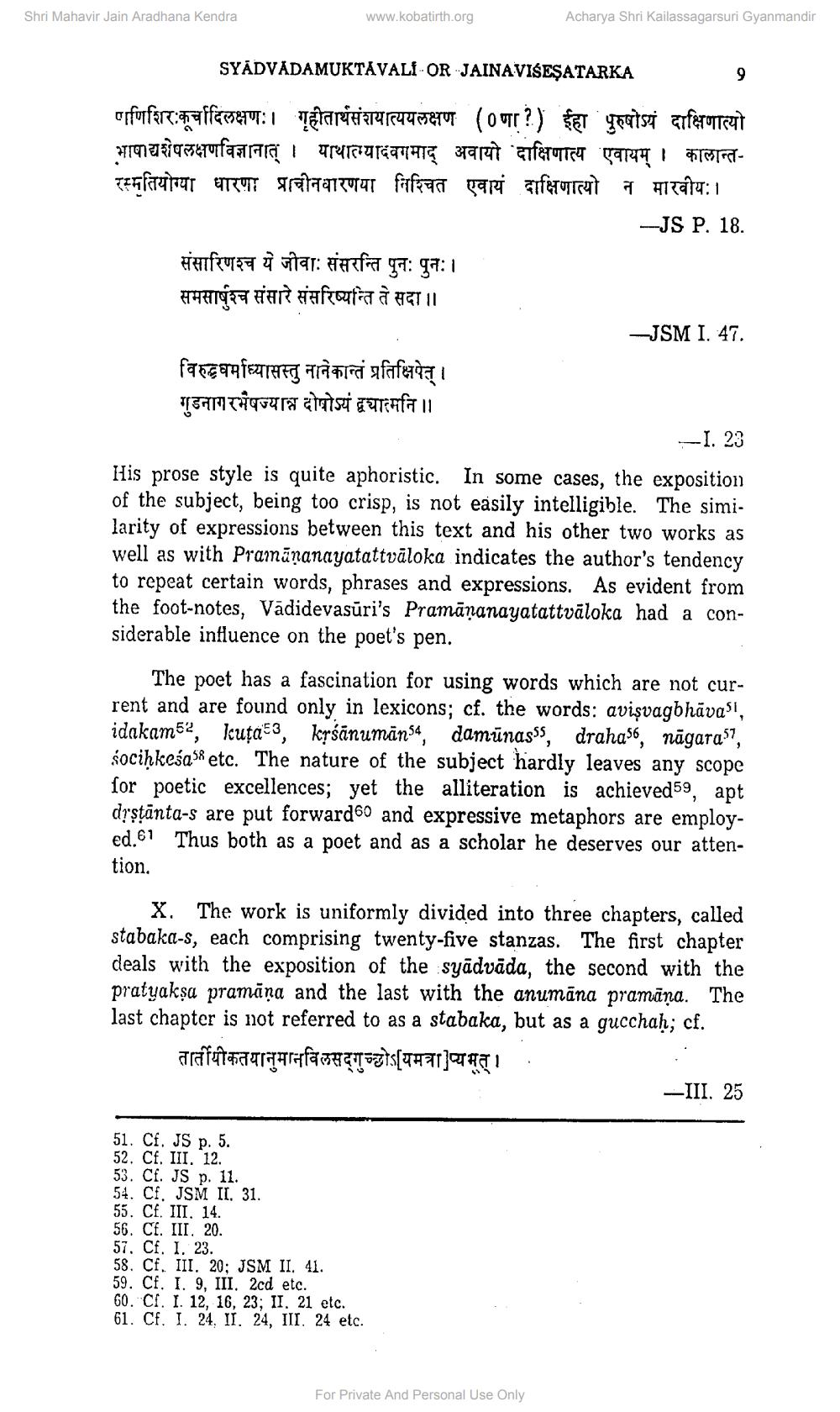________________
Shri Mahavir Jain Aradhana Kendra
www.kobatirth.org
Acharya Shri Kailassagarsuri Gyanmandir
SYADVADAMUKTAVALI-OR JAINAVIŠEŞATARKA
पणिशिर:कूर्चादिलक्षणः। गृहीतार्थसंशयात्ययलक्षण (०णा?) ईहा पुरुषोऽयं दाक्षिणात्यो भाषाद्यशेषलक्षणविज्ञानात् । यायालयादवगमाद् अवायो दाक्षिणात्य एवायम् । कालान्तरस्मतियोग्या धारणा प्राचीनधारणया निश्चित एवायं दाक्षिणात्यो न मारवीयः ।
-JS P. 18. संसारिणश्च ये जीवाः संसरन्ति पुन: पुनः । समसाएश्च संसारे संसरिष्यन्ति ते सदा॥
-JSM I. 47. विरुद्धधर्माध्यासस्तु नानेकान्तं प्रतिक्षिपेत् । गुडनागरभैषज्यान्न दोषोऽयं द्वयात्मनि ।।
I. 23 His prose style is quite aphoristic. In some cases, the exposition of the subject, being too crisp, is not easily intelligible. The similarity of expressions between this text and his other two works as well as with Pramānanayatattvāloka indicates the author's tendency to repeat certain words, phrases and expressions. As evident from the foot-notes, Vādidevasūri's Pramāņanayatattvāloka had a considerable influence on the poet's pen.
The poet has a fascination for using words which are not current and are found only in lexicons; cf. the words: avişvagbhāvasi, idakam52, kutas3, krśanumāns4, damūnasss, drahas, nāgara), sociḥkeśas etc. The nature of the subject hardly leaves any scope for poetic excellences; yet the alliteration is achieved 59, apt dystānta-s are put forward60 and expressive metaphors are employed.61 Thus both as a poet and as a scholar he deserves our attention.
X. The work is uniformly divided into three chapters, called stabaka-s, each comprising twenty-five stanzas. The first chapter deals with the exposition of the syādvāda, the second with the pratyakṣa pramāna and the last with the anumāna pramāna. The last chapter is not referred to as a stabaka, but as a gucchaḥ; cf. तार्तीयीकतयानुमानविलसद्गुच्छोऽ[यमत्रा]प्यमुत्। .
- III. 25
51. Cf. JS p. 5. 52. Cf. III. 12. 53. Cf. JS p. 11. 54. Cf. JSM II. 31. 55. Cf. III. 14. 56. Cf. III. 20. 57. Cf. I. 23. 58. Cf. III. 20; JSM II. 41. 59. Cf. I. 9, III.2cd etc. 60. CI. I. 12, 16, 23; II. 21 etc. 61. Cf. I. 24. II. 24, III, 24 etc.
For Private And Personal Use Only




